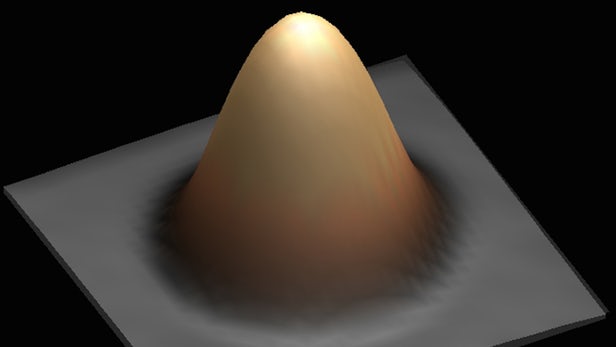Single-atom magnet paves way for denser storage devices

One bit of data was stored on a single atom of holmium, seen here through a scanning tunnelling microscope(Credit: IBM Research)
The phone in your pocket can hold millions of times more information than a device the size of a fridge could decades ago, and for that we can thank continuous improvements to data storage density. Now, having created the world's smallest magnet, IBM has managed to store one bit of data in a single atom, in a breakthrough that could lead to storage devices that can hold 1,000 times more data in the same physical space as current HDDs.
For those who don't pay much attention to the wizardry going on inside their computer, hard disk drives store data magnetically, as a series of tiny magnetic dots on a sheet of metal. Each dot represents one bit of data: a demagnetized dot represents a zero, and if it's magnetized, it's a one. Although they're already pretty small, IBM's new research could shrink these data-storing units down from about 100,000 atoms each to just one.
"Magnetic bits lie at the heart of hard disk drives, tape and next-generation magnetic memory," says Christopher Lutz, lead researcher on the study. "We conducted this research to understand what happens when you shrink technology down to the most fundamental extreme – the atomic scale."
To work at such a small scale, the researchers used a scanning tunnelling microscope (STM), a device that can manipulate individual atoms in a vacuum, safe from interference by air molecules or other factors. The atoms in question were of a rare-Earth element called holmium, and by applying an electrical current to them, the team was able to change their magnetic orientation, representing a binary bit of data. According to the scientists, that makes them the world's smallest magnets, and even when spaced just one nanometer apart, information on the atoms could be individually written and read.
In the future, a magnetic memory system that works with individual atoms, spaced this closely together, could allow for hard drives and solid state memory chips that are up to 1,000 times denser than those we use today. By way of illustration, the researchers use the example of being able to store 35 million songs – the entire library of iTunes – on a device no bigger than a credit card. That's good news for the massive data centers we need to keep the internet up and running.
The research was published in the journal Nature, and the team explains the study in the video below.
Source: IBM
